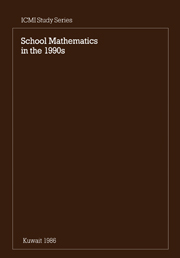Book contents
- Frontmatter
- Contents
- Foreword
- Acknowledgements
- 1 Mathematics in a Technological Society
- 2 Mathematics and General Educational Goals
- 3 The Place and Aims of Mathematics in Schools
- 4 The Content of the School Mathematics Curriculum
- 5 On Particular Content Issues
- 6 Classrooms and Teachers in the 1990s
- 7 Research
- 8 The Processes of Change
- 9 The Way Ahead
- Bibliography
8 - The Processes of Change
Published online by Cambridge University Press: 26 April 2011
- Frontmatter
- Contents
- Foreword
- Acknowledgements
- 1 Mathematics in a Technological Society
- 2 Mathematics and General Educational Goals
- 3 The Place and Aims of Mathematics in Schools
- 4 The Content of the School Mathematics Curriculum
- 5 On Particular Content Issues
- 6 Classrooms and Teachers in the 1990s
- 7 Research
- 8 The Processes of Change
- 9 The Way Ahead
- Bibliography
Summary
The preceding chapters have been largely devoted to ‘change’: to the need to react to societal and technological changes, to foresee and prepare for change, to make changes. We have been largely preoccupied with the general question, ‘What changes in school mathematics are required?’ Answering such a question becomes, however, merely an interesting intellectual exercise, unless we also ask – and seek to answer:
How are changes to be effected?
How schools change
There is no doubt at all that schools change. They are not the same institutions that they were twenty or forty years ago: pupils' behaviour, awareness, perceptions and attitudes have changed, and so have those of their teachers. This must be true to a greater or lesser extent in all countries. Sometimes, but not always, the organisation of schooling and schools has changed and together with it, curricula. Change, then, is constantly taking place even though we cannot always account for it. Yet often, amidst all the changes, the very things we should most like to change – be they attitudes, practices, content – remain obdurately fixed. Moreover, schools have changed more slowly than the societies in which they are embedded.
Our knowledge of how to achieve desired changes, of the way in which the processes of change are generated, operate and can be directed, is extremely limited.
- Type
- Chapter
- Information
- School Mathematics in the 1990s , pp. 91 - 98Publisher: Cambridge University PressPrint publication year: 1987

